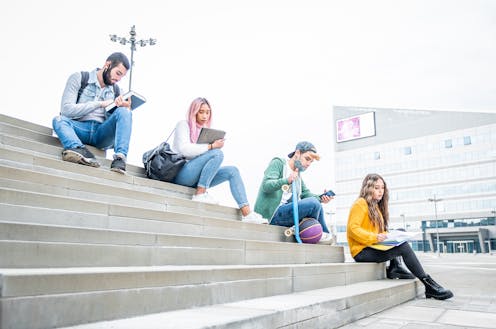COVID has changed students' needs and expectations. How do universities respond?
- Written by Shirley Alexander, Deputy Vice-Chancellor and Vice-President (Education and Students), University of Technology Sydney

One could be forgiven for thinking moving lectures online is the only change to the higher education experience to come from the COVID-19 pandemic. Barely a day goes by without a headline that another university will conduct “lectures” in online mode only. But there is so much more potential for change in the wake of the pandemic. Our experiences in Australia and the UK have shown one significant change is that university decision-making has become more student-centred in response to students’ demands for flexibility.
Flexibility is often understood as student preferences for modes of learning. Some students see benefits in fully online learning and may decide to continue in that mode. The majority, though, have expressed a strong desire to return to campus. But they want to retain the flexibility of online learning.
Read more: Digital learning is real-world learning. That's why blended on-campus and online study is best
How can universities meet these expectations?
Let’s take timetabling as one example. For decades, timetables have been produced to maximise the use of expensive campus infrastructure. Students had to fit their complex lives around that.
During emergency remote teaching many students were able to choose an online class or watch a recording at a time that suited them. Having experienced this flexibility, there is increasing evidence of a demand for 24/7/365 access to learning. Or is there? Have we really understood students’ “demands” for flexibility and are we making decisions in their best interests?
Such 24/7 flexibility involves a significant trade-off for students. For one thing, it means they lose consistent contact with the same peers as they dip in and out of different classes.
Current timetables mean students sometimes travel significant distances for a single one-hour class. It’s not surprising these students would prefer to access a class remotely or at a later time.
But could we use technology to build timetables that cluster classes over fewer days to reduce students’ total travel time? In this way, a student-centred approach would fit in with students’ lives rather than the other way around. At the same time, it would protect the essential elements of the on-campus experience.
Consider what kind of post-COVID, on-campus experiences students want. Students enrolled at campus-based institutions often said they missed the social environment during lockdown. So it is no surprise they now seek social opportunities to make new friends, build new networks through social activities like clubs and societies, engage with different perspectives and be physically located within the academic community.
Managing change in a time of constraints
A shift to more student-centred decision-making will need to confront external constraints. One is the urgent need to find ways of meeting the costs of education.
Governments worldwide had already reduced spending on higher education before the pandemic. The pandemic has left governments facing a challenging financial situation: the government debt legacy and economic recession resulting from COVID as well as rising student loan debt. They are now seeking to lower public spending on higher education further.
Read more: After 2 years of COVID, how bad has it really been for university finances and staff?
Another challenge is the demand to prepare highly skilled graduates to overcome skills shortages made worse by COVID. Employers are seeking capabilities such as problem solving, resilience, social influence and stress tolerance, in addition to particular knowledge and skills.
To reduce costs, teaching may need to draw on freely available open education resources or online content from commercial providers. But universities still have to make sure they design active learning experiences on campus to allow students to make friends, experience student life and feel part of the academic community.
Crucially, active learning experiences provide the environment for meaningful activity, whether online or in person. This can be supported by scaffolded learning to progressively develop students’ academic, metacognitive and professional skills from orientation through to graduation.
Caring has to be a priority
An added dimension is the pastoral and caring role universities play in the lives of students. Caring has always been an important facet of teaching, but never more so than during the pandemic.
Academics have spent long hours giving academic and pastoral care to students. A UCL study provides evidence of the additional (often unaccounted) time and emotional labour academics invested in supporting students online.
As we return to campus, caring has to continue. Students still face uncertainties that cause them anxiety. Mental health is at an all-time low.
The added costs of caring for students come at a time of major financial pressure on all institutions. So, student-centred decision-making will be vital in determining how this care can be provided as an integral part of our teaching.
The big questions for higher education go beyond which parts of the student experience should be online and which should be on-campus. The bigger question is how we can accommodate demands for flexibility while preserving the social aspects that provide crucial academic and pastoral support at the same time as ensuring sustainability.
Taking a student-centred approach to decision-making in higher education, informed by a careful analysis of students’ experiences, might be a start.
Authors: Shirley Alexander, Deputy Vice-Chancellor and Vice-President (Education and Students), University of Technology Sydney



















